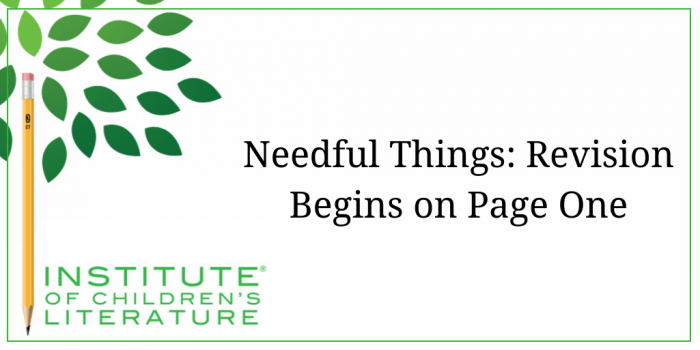1000 N. West Street #1200, Wilmington, DE 19801
© 2024 Direct Learning Systems, Inc. All rights reserved.

One of the first things to keep in mind about today’s readers is that they are extremely busy.

Now the pressure of these first pages can make it paralyzing to start writing. But the reality is that you should feel comfortable starting the writing even with a weak beginning, since it’s during revision that you really polish your opening. It’s during revisions that a good story normally gains a great beginning. So don’t worry about the beginning during the writing stage. It’s definitely a revision-stage job. Once you get to the revision, it’s not at all uncommon for that opening to change completely. You may find your story starts best in a different spot or at a different time. You may realize you explain a little too much. This is normal. Doing a lot of explaining as you get started writing a story is a common way we begin understanding our own story––but all that explaining and hesitation will need to be removed during the revision. So if explaining doesn’t belong at the beginning, what does? Let’s see.
Many writers worry that giving any word count to setting is weakening the beginning. On the contrary, giving a sense of place allows the reader to begin building the reality of the story in his or her head. So setting actually increases engagement. It doesn’t have to take many words and it can easily happen during action (which certainly avoids any chance of a weak beginning.) Consider this opening:

The locker and the hallway are suggestive of a school, and for a children’s story this would be enough setting for the reader to imagine a school. If you’re writing a children’s story taking place somewhere with lockers and a hall other than a school, you’d need to add a little more to make that clear. Maybe something like this:
Brie shoved her safety vest into the locker and slammed the door. When she spun around, the staff only hallway was almost empty. Almost. A great, big bully loomed over Brie. “What do you want, Lexi?”
Here we have a little more detail to build an imagined setting that isn’t about school. Like the first example, this one doesn’t linger on a lot of details. Whether we’re writing short stories or chapter books or novels, writing for young people nearly always means shorter word counts than writing for adults, so writing lean is necessary. But that doesn’t mean leaving out something we need. Notice that these openings include something else: movement. That brings us to the next needful thing.
Strong openings drop us into a specific moment of the story where something happens. A strong opening gives us the sense of people (even if it’s only your main character), place, and action. Your main character will always be engaged in a specific, engaging, purposeful action that is important to the plot (or to characterization). This need for something engaging and purposeful happening is why you have probably seen strong warnings against opening your story as the character wakes up. That often feels like a meaningful time as you’re writing, but it is rarely a time for specific, engaging, purposeful action. Now if the main character woke to find a monster sitting on his chest, then a waking up moment might be great, but that’s because it is engaging and purposeful (as surely there is some reason the monster was on his chest.)

If cutting a scene will make the opening stronger and more purposeful, then cut it. That is likely to mean some tweaking and smoothing to make your new opening scene work, but that’s just part of revision. Revision is work. But it’s good work because it brings you closer to publication. What else will do that? Let’s look at two more needful things.
One of the best ways to engage the reader is to surprise him (without confusing him). Notice the sample opening in the first section. Not much happens. I set the scene in a school (or possibly work place). I close a locker and a bully is there. That is a surprise. It’s not as surprising as waking to a monster on your chest, but it is a surprise. Always offer the reader something that surprises. Maybe your hulking pirate character longs to be a dancer. That would be a surprise. Maybe your familiar classroom scene is revealed to be on a space station. That would be a surprise. Surprises can be big, like a character running from a bully and discovering a secret door leading to an unexpected scene. Or a surprise can be small, such as a little girl with a ridiculous name. If your story is funny, the surprise should almost certainly be funny as well. If the story is meant to be an adventure or a fantasy or a spooky tale, introducing some hint of that in your surprise can help hook the reader while also setting up expectations for bigger surprises later.
When we were small and folks were always telling us to use our indoor voices, they meant voices that don’t draw too much attention. Writing is time for your outdoor voice. It’s the time to use a voice that is truly yours.

Always keep in mind that whatever your voice emerges as, it will need to be very clear. In writing, clarity is the number one most necessary style element. Anything that interferes with clarity needs to change. But when you combine clarity with authenticity, you will automatically get the voice that works best. If you feel like your voice isn’t flowing like you want, the problem isn’t with any need to struggle, it’s almost always with a need to better understand and relate to your characters, your story and your setting. When those things are real for you, you can relax into your writing and your real voice will just flow.
Now, your writing voice is a bit different from the voice of each character (even though the same word is being used). The voice of each character is the way the person speaks and thinks that is him (or her) when most authentic. If your characters tend to sound too much alike, you likely either have (1) not spent enough time making them real in your head or (2) you have too many characters to carry authentically in your imagination. The place of improving the voice of your characters lies in your imagination (and sometimes in your memory). Just as your voice comes from the places you’ve been and the things you’ve experienced, the same is true for your characters. So get to know them better and they will begin to speak to you in more authentic ways. Imagination truly is key.
Dig deeper into making the characters, and the place, and the action real in your head. Run it through your mind’s eye as many times as you can. Imagine standing in the middle of your scene and look around––what objects are there? What is the temperature? Can you smell anything? The more real the scene becomes for you, the more it will unfold in a unique way, and that will pull your voice along with it. Most of the time, lack of voice is just lack of time spent really making the moment feel in your head like a memory, not a mechanical collection of words.
So look at your opening as you revise. Do you put us in a specific place? Does specific action occur right away? Do you surprise the reader? Is it clear and does it read as if it were effortless to write? Good writing always looks like it came out easily (even though we know it didn’t). Don’t be afraid to revise your opening over and over. It’ll be worth it. I promise.
With over 100 books in publication, Jan Fields writes both chapter books for children and mystery novels for adults. She’s also known for a variety of experiences teaching writing, from one session SCBWI events to lengthier Highlights Foundation workshops to these blog posts for the Institute of Children’s Literature. As a former ICL instructor, Jan enjoys equipping writers for success in whatever way she can.
1000 N. West Street #1200, Wilmington, DE 19801
© 2024 Direct Learning Systems, Inc. All rights reserved.
1000 N. West Street #1200, Wilmington, DE 19801
© 2024 Direct Learning Systems, Inc. All rights reserved.
1000 N. West Street #1200, Wilmington, DE 19801
© 2024 Direct Learning Systems, Inc. All rights reserved.
1000 N. West Street #1200, Wilmington, DE 19801
© 2025 Direct Learning Systems, Inc. All rights reserved.
1000 N. West Street #1200, Wilmington, DE 19801
©2025 Direct Learning Systems, Inc. All rights reserved. Privacy Policy.
5 Comments